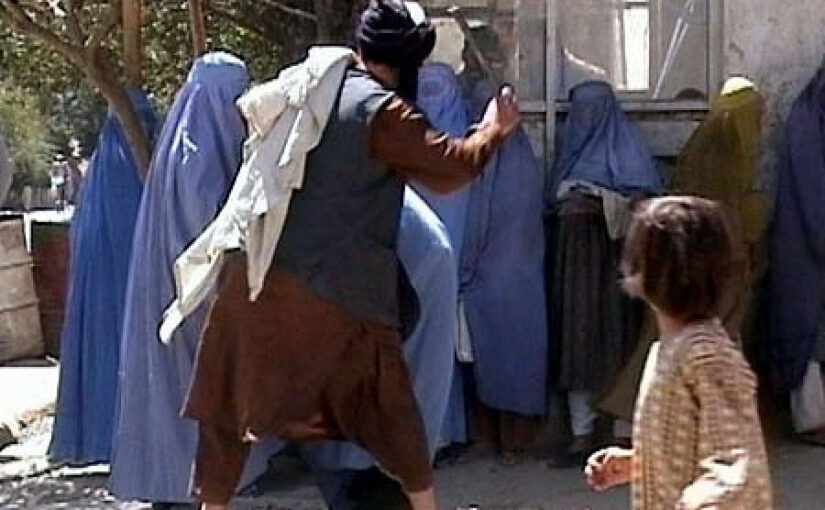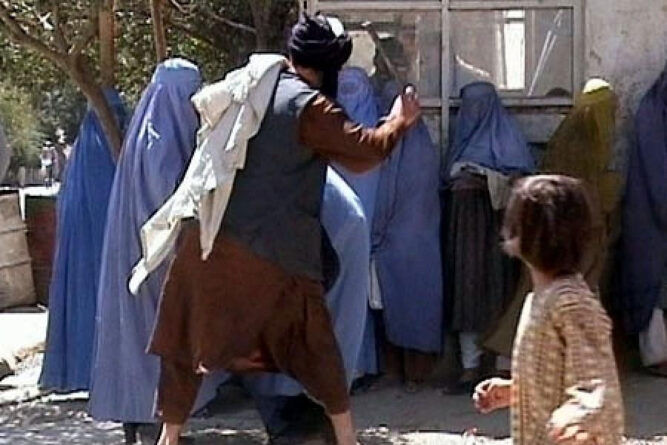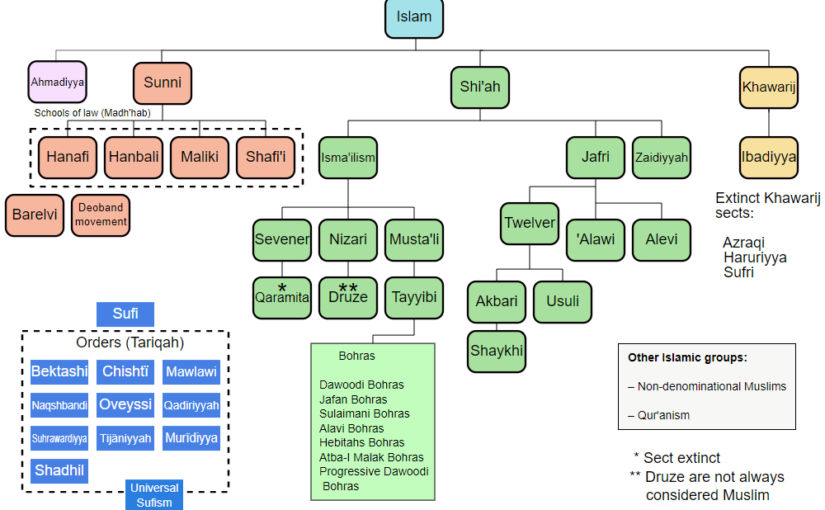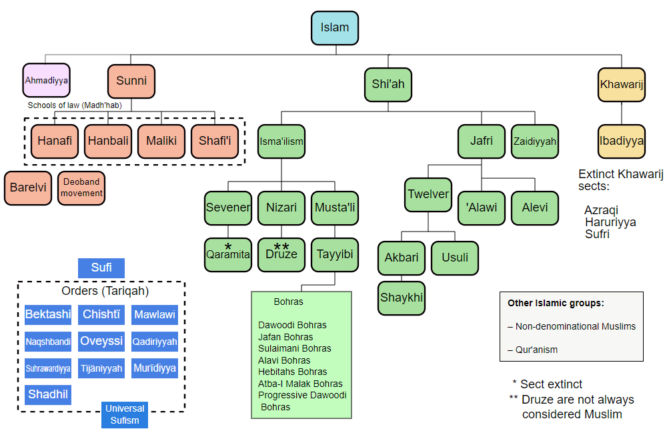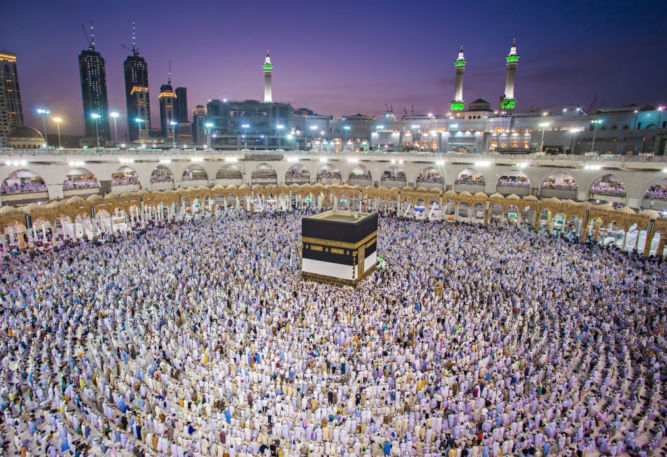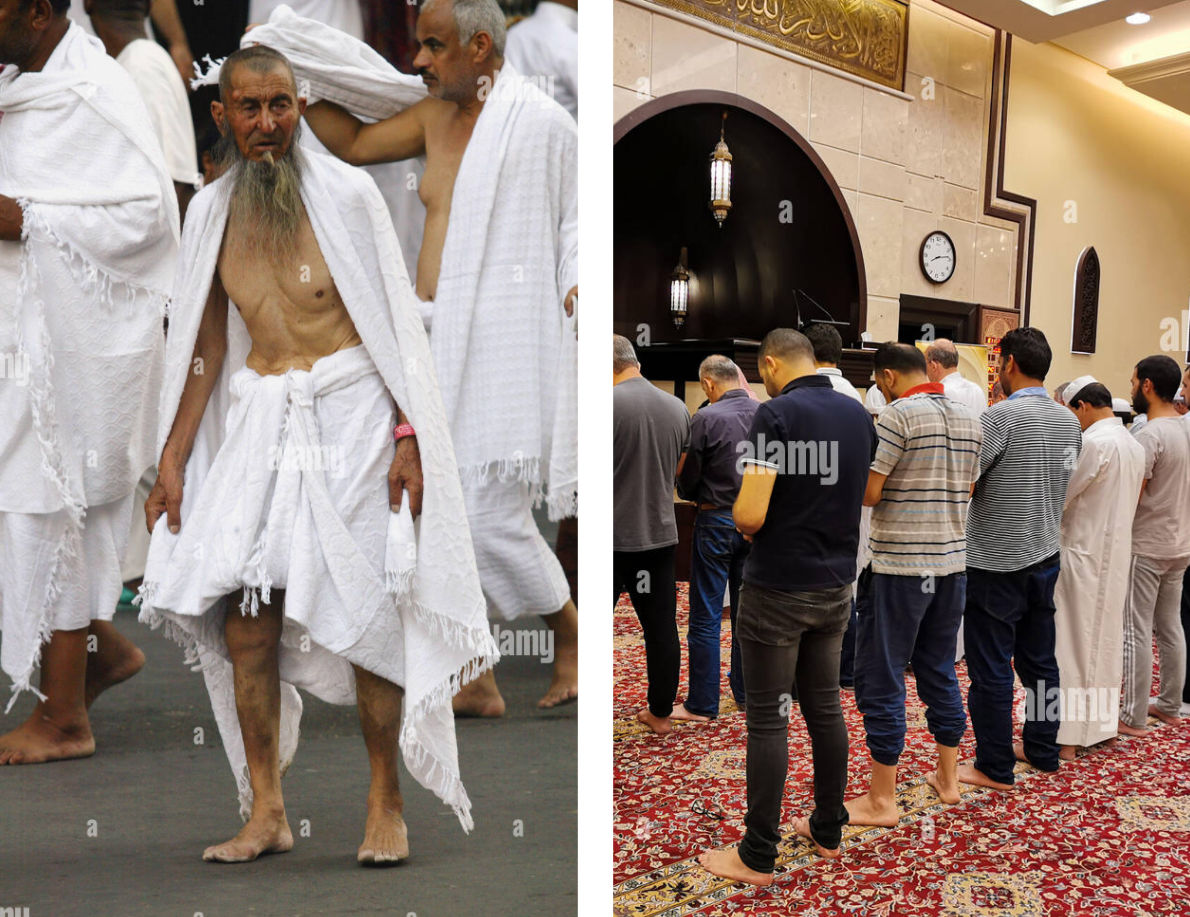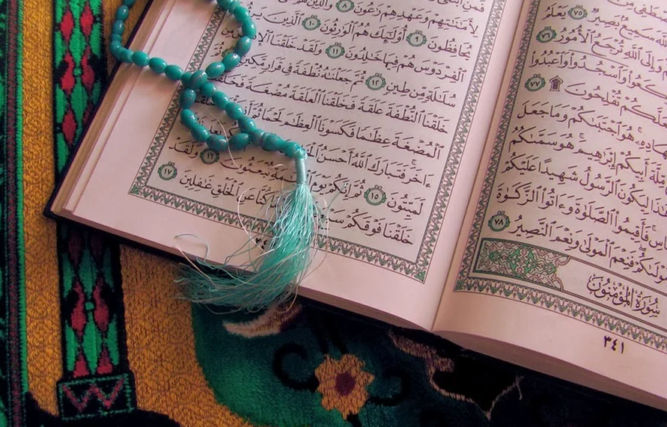This article has been translated into other languages:
- Arabic
- Indonesian
- Urdu (coming soon)
- Hindi (coming soon)
- Farsi (coming soon)
- Turkish (coming soon)

Most Muslims believe that, in addition to the Quran, the hadith is a valid source of Islamic law. The arguments below easily prove using the Quran and basic logic that most Muslims are not only wrong, but they are also kafir according to the Quran because they judge using the hadith.
Let’s begin.
Only judge by God’s scriptures (e.g. Torah, Quran)
Before God sent down the Quran to Muhammad, He sent down the Torah to Moses for Jews to judge by. At that time, prophets, Jewish rabbis and scholars only judged using the Torah. This is proven in verse 5:44 where God also tells people not to exchange His verses with anything else, e.g. man-made laws, and that whoever does not judge by what God sent down, e.g. Torah, Quran, then they are disbelievers.
| إِنَّا أَنزَلْنَا التَّوْرَاةَ فِيهَا هُدًى وَنُورٌ ۚ يَحْكُمُ بِهَا النَّبِيُّونَ الَّذِينَ أَسْلَمُوا لِلَّذِينَ هَادُوا وَالرَّبَّانِيُّونَ وَالْأَحْبَارُ بِمَا اسْتُحْفِظُوا مِن كِتَابِ اللَّهِ وَكَانُوا عَلَيْهِ شُهَدَاءَ ۚ فَلَا تَخْشَوُا النَّاسَ وَاخْشَوْنِ وَلَا تَشْتَرُوا بِآيَاتِي ثَمَنًا قَلِيلًا ۚ وَمَن لَّمْ يَحْكُم بِمَا أَنزَلَ اللَّهُ فَأُولَٰئِكَ هُمُ الْكَافِرُونَ |
| Indeed, We sent down (Arabic: an-zal) the Torah, in which was guidance and light. The prophets who submitted [to God] judged by it for the Jews, as did the rabbis and scholars by that with which they were entrusted of the Scripture of God, and they were witnesses thereto. So do not fear the people but fear Me, and do not exchange My verses for a small price. And whoever does not judge by what God has sent down (Arabic: an-zal), then it is those who are the disbelievers. (Quran: 5:44) |
After Moses died in the 2nd century CE, rabbis compiled a book called the Talmud containing the
- Mishnah (Oral Torah / supposed sayings or hadith of Moses)
According to Jewish tradition, the Oral Torah was passed down orally in an unbroken chain from generation to generation until it was finally committed to writing. This is very similar to Islamic hadith / supposed sayings of Muhammad). Hadith compilers, e.g. Bukhari, may have even gotten the idea to compile their hadith books from the Mishnah. - Gemara
A series of running commentaries and debates concerning the Mishnah. The equivalent may be Quranic or hadith tafsir (exegesis).
Nowadays, most Jews judge by scripture (Torah) and the Talmud, which contains the supposed sayings of Moses. This is very similar to how followers of the Quran at first only judged by the Quran until the hadith books (supposed sayings of Muhammad) were written around 200 years after Muhammad’s death, at which time people began judging by both the Quran and the hadith.
Timeline of events
| Year | Event |
|---|---|
| Very long time ago | God sent down the Torah to Moses |
| Very long time ago | Prophets, Jewish rabbis and scholars judged using only the Torah |
| ~200 CE | Jewish rabbis wrote the Talmud containing supposed sayings of Moses |
| ~ 200 CE onwards | Jews judged using both the Torah and the Talmud |
| 609 – 632 CE | God sent down the Quran to Muhammad |
| ~ 800 CE | Bukhari wrote the hadith containing supposed sayings of Muhammad |
| ~ 800 CE onwards | Muslims judged using both the Quran and the hadith |
Only judge by the Quran
Quran verse 45:6 explicitly tells people to only judge by the Quran and not the hadith. Note the Arabic word used for hadith is hadith.
| تِلْكَ آيَاتُ اللَّهِ نَتْلُوهَا عَلَيْكَ بِالْحَقِّ ۖ فَبِأَيِّ حَدِيثٍ بَعْدَ اللَّهِ وَآيَاتِهِ يُؤْمِنُونَ |
| These are the verses (ayat) of God which We recite to you in truth. Then in what hadith (Arabic: ha-deeth) after God and His verses will they believe? (Quran: 45:6) |
The verses (ayat) of God are the Quran. The hadith are obviously not verses of God. No one in their right mind, including hadith followers, would say the hadith verses are from God.
Quran verse 5:44 clearly states that anyone who judges by anything besides the Quran is a disbeliever (kafir).
| … وَمَن لَّمْ يَحْكُم بِمَا أَنزَلَ اللَّهُ فَأُولَٰئِكَ هُمُ الْكَافِرُونَ |
| And whoever does not judge by what God has sent down (Arabic: an-zal) – then it is they who are the disbelievers (Arabic: kafirun). (Quran: 5:44) |
What God “sent down” (Arabic: an-zal) was the Quran, and before that, the Torah, both of which are scriptures from God Himself. Supposed sayings (hadith) of Moses and Muhammad were not “sent down” by God. Notice the use of the phrase “sent down” (Arabic: an-zal) in the following verses, which confirm that what God “sent down” was the Quran and not the hadith.
| إِنَّا أَنزَلْنَاهُ قُرْآنًا عَرَبِيًّا لَّعَلَّكُمْ تَعْقِلُونَ |
| Indeed, We have sent it down (Arabic: an-zal) as an Arabic Qur’an that you might understand. (Quran: 12:2) |
| وَكَذَٰلِكَ أَنزَلْنَاهُ قُرْآنًا عَرَبِيًّا وَصَرَّفْنَا فِيهِ مِنَ الْوَعِيدِ لَعَلَّهُمْ يَتَّقُونَ أَوْ يُحْدِثُ لَهُمْ ذِكْرًا |
| And thus We have sent it down (Arabic: an-zal) as an Arabic Qur’an and have diversified therein the warnings that perhaps they will avoid [sin] or it would cause them remembrance. (Quran: 20:113) |
| لَوْ أَنزَلْنَا هَٰذَا الْقُرْآنَ عَلَىٰ جَبَلٍ لَّرَأَيْتَهُ خَاشِعًا مُّتَصَدِّعًا مِّنْ خَشْيَةِ اللَّهِ ۚ وَتِلْكَ الْأَمْثَالُ نَضْرِبُهَا لِلنَّاسِ لَعَلَّهُمْ يَتَفَكَّرُونَ |
| If We had sent down (Arabic: an-zal) this Qur’an upon a mountain, you would have seen it humbled and coming apart from fear of Allah. And these examples We present to the people that perhaps they will give thought. (Quran: 59:21) |
In verse 13:37, we read that God sent down an “Arabic legislation” which confirms that the Arabic Quran is the law to judge by.
| وَكَذَٰلِكَ أَنزَلْنَاهُ حُكْمًا عَرَبِيًّا ۚ… |
| And thus We have sent down (Arabic: an-zal) this as an Arabic legislation. … (Quran: 13:37) |
The hadith is not a revelation
Some hadithers will claim that, in addition to the Quran, Prophet Muhammad’s day-to-day sayings are also somehow revelations from God. They can easily be proven wrong.
Proof 1:
Quran verse 66:1 indicates a situation where God questioned Muhammad after Muhammad forbade something that God made lawful. If everything Muhammad said was a revelation from God, then why would God question Muhammad about something Muhammad had said? Logically, because not everything Muhammad said was a revelation from God.
| يَا أَيُّهَا النَّبِيُّ لِمَ تُحَرِّمُ مَا أَحَلَّ اللَّهُ لَكَ ۖ تَبْتَغِي مَرْضَاتَ أَزْوَاجِكَ ۚ وَاللَّهُ غَفُورٌ رَّحِيمٌ … |
| O Prophet, why do you forbid what God has made lawful for you, seeking the approval of your wives? … (Quran 66:1 part) |
Proof 2:
In verses 69:44-46, God threatened to kill Prophet Muhammad if Muhammad ever made false statements about God. This proves that not everything Muhammad said was a revelation from God since if everything was, God would not have needed to make this threat. If God wanted to say that literally every word that came out of Muhammad’s mouth was a revelation from God, He could have just said that without making any threats.
| وَلَوْ تَقَوَّلَ عَلَيْنَا بَعْضَ الْأَقَاوِيلِ لَأَخَذْنَا مِنْهُ بِالْيَمِينِ ثُمَّ لَقَطَعْنَا مِنْهُ الْوَتِينَ |
| And if he [Muhammad] had made up about Us [God] some [false] sayings, We would have seized him by the right hand; Then We would have cut from him the aorta. (Quran 69:44-46) |
Proof 3:
Hadith Sahih al-Bukhari # 1629 indicates that Muhammad forbade praying at sunrise (fajr) and sunset (maghrib). This is a clear contradiction with the Quran, which even hadithers would agree with.
| Narrated `Abdullah: I heard the Prophet (ﷺ) forbidding the offering of prayers at the time of sunrise and sunset. Sahih al-Bukhari 1629 https://sunnah.com/bukhari/25/113 |
All Muslims, even ones who use the hadith for Islamic law, would continue to pray fajr and maghrib despite this sahih hadith forbidding it. In this case, they may say that even though this hadith is sahih, they choose to ignore it because it contradicts the Quran, but they’ll say that other hadith are still valid. In other words, they end up choosing to follow some hadith and ignoring others. Unsurprisingly, Quran verse 68:36-38 questions these people who judge by a book (e.g. the hadith books) in which they pick and choose whichever laws they want to follow.
| مَا لَكُمْ كَيْفَ تَحْكُمُونَ أَمْ لَكُمْ كِتَابٌ فِيهِ تَدْرُسُونَ إِنَّ لَكُمْ فِيهِ لَمَا تَخَيَّرُونَ |
| What is [the matter] with you? How do you judge? Or do you have a book in which you learn that indeed for you in it is whatever you choose? (68:36-38) |
The fact that hadithers acknowledge that some sahih hadith are unacceptable should make them question the authenticity of all other hadith, even if they sound acceptable.
Prophet Muhammad only warned using the Quran
Some hadithers, in thinking that they are imitating Muhammad, will use the hadith to warn other people of Islamic laws. Ironically, Quran verses 50:45 and 6:19 prove that Muhammad himself only warned using the Quran.
| … فَذَكِّرْ بِالْقُرْآنِ مَن يَخَافُ وَعِيدِ |
| … Therefore [O Muhammad] remind by the Qur’an whoever fears My threat. (50:45 part) |
| … وَأُوحِيَ إِلَيَّ هَٰذَا الْقُرْآنُ لِأُنذِرَكُم بِهِ وَمَن بَلَغَ … |
| … this Qur’an was revealed to me (Muhammad) that I may warn you thereby and whomever it reaches … (6:19 part) |
Prophet Muhammad only followed the Quran
Hadithers think that they are following Muhammad’s way by following the hadith about him. Ironically, Muhammad says in Quran verse 50:45 that he himself only follows the Quran.
| وَإِذَا تُتْلَىٰ عَلَيْهِمْ آيَاتُنَا بَيِّنَاتٍ ۙ قَالَ الَّذِينَ لَا يَرْجُونَ لِقَاءَنَا ائْتِ بِقُرْآنٍ غَيْرِ هَٰذَا أَوْ بَدِّلْهُ ۚ قُلْ مَا يَكُونُ لِي أَنْ أُبَدِّلَهُ مِن تِلْقَاءِ نَفْسِي ۖ إِنْ أَتَّبِعُ إِلَّا مَا يُوحَىٰ إِلَيَّ |
| …And when Our verses are recited to them as clear evidences, those who do not expect the meeting with Us say, “Bring us a Qur’an other than this or change it.” Say, [O Muhammad], “It is not for me to change it on my own accord. I only follow what is revealed to me. … (10:15) |
“How to pray” argument
Hadithers will inevitably tell you that the hadith are necessary for Islamic law because it explains how to pray. What these people don’t realize is that
- No one learns how to pray by reading the hadith. Instead, they learn from other people like their parents.
- The hadith does not clearly explain how to pray. Considering that prayer is a daily ritual, the fact that the hadith doesn’t say much about how to pray should make you question the authenticity of the hadith in general.
- Even if the hadith did clearly explain how to pray, then since the hadith books were not written until ~200 years after Muhammad’s death, then for 2 centuries after Muhammad died, no one could pray because the hadith books had not been written yet. It is illogical to believe that people could not pray for 200 years because they were waiting for Bukhari to write his hadith book.
It is reasonable to believe that God did not provide step-by-step instructions on how to pray in the Quran because God knew that people would first learn by following Muhammad. Then after Muhammad died, people would learn from their communities, e.g. when they pray at mosques on Friday. In actuality, knowledge of how to pray is passed down from one generation to another, not from reading through thousands of hadith trying to figure it out like some huge jigsaw puzzle.
“Interpretation” argument
Some hadithers will argue that my interpretation of the verses above, or any other verse for that matter, is incorrect. They seem to think that only their interpretation is the correct interpretation. The Quran addresses the issue of interpretation in verse 3:7, where God states that there are two types of verses.
1. Specific (clear) verses
These verses are the foundation of the Quran, and since they are clear, interpretation isn’t necessary. The verses mean what they say because the meaning is literal.
2. Unspecific (unclear) verses
These verses are unclear, and only God knows the correct meaning. These unclear verses exist as a test for people who want to interpret them in a particular way so as to justify their personal opinion and interests.
| هُوَ الَّذِي أَنزَلَ عَلَيْكَ الْكِتَابَ مِنْهُ آيَاتٌ مُّحْكَمَاتٌ هُنَّ أُمُّ الْكِتَابِ وَأُخَرُ مُتَشَابِهَاتٌ ۖ فَأَمَّا الَّذِينَ فِي قُلُوبِهِمْ زَيْغٌ فَيَتَّبِعُونَ مَا تَشَابَهَ مِنْهُ ابْتِغَاءَ الْفِتْنَةِ وَابْتِغَاءَ تَأْوِيلِهِ ۗ وَمَا يَعْلَمُ تَأْوِيلَهُ إِلَّا اللَّهُ ۗ وَالرَّاسِخُونَ فِي الْعِلْمِ يَقُولُونَ آمَنَّا بِهِ كُلٌّ مِّنْ عِندِ رَبِّنَا ۗ وَمَا يَذَّكَّرُ إِلَّا أُولُو الْأَلْبَابِ |
| It is He who has sent down (Arabic: an-zal) to you, [O Muhammad], the Book; in it are verses [that are] precise – they are the foundation of the Book – and others unspecific. As for those in whose hearts is deviation [from truth], they will follow that of it which is unspecific, seeking discord and seeking an interpretation [suitable to them]. And no one knows its [true] interpretation except God. But those firm in knowledge say, “We believe in it. All [of it] is from our Lord.” And no one will be reminded except those of understanding. (3:7) |
Since the verses used in my arguments above are clear, then the “incorrect interpretation” argument is invalid.
“Tradition” argument
Some hadithers will argue that Islamic tradition must be respected and taken into consideration and since traditionally Muslims have followed the hadith, then Muslims must continue to do so. This argument is invalid because not all traditions are correct and tradition is not a basis for religion. Nowhere in the Quran does it say that followers should follow tradition and the practices of their ancestors. Conversely, the Quran actually provides an example that clearly shows how tradition has no place in religion and is most definitely not a replacement for clear commandments in the Quran.
In verses 21:52-53 Abraham asked his own father and his people why they worshiped statues. Their answer was that they were just following the tradition of their forefathers which was obviously incorrect.
| إِذْ قَالَ لِأَبِيهِ وَقَوْمِهِ مَا هَٰذِهِ التَّمَاثِيلُ الَّتِي أَنتُمْ لَهَا عَاكِفُونَ قَالُوا وَجَدْنَا آبَاءَنَا لَهَا عَابِدِينَ |
| When he (Prophet Abraham) said to his father and his people, “What are these statues to which you are devoted?” They said, “We found our fathers worshippers of them.” |
In verse 2:170, Abraham’s father and people were told to follow what God sent down but they instead insisted on following the tradition of their fathers. God then says that their fathers knew nothing and were not guided.
| وَإِذَا قِيلَ لَهُمُ اتَّبِعُوا مَا أَنزَلَ اللَّهُ قَالُوا بَلْ نَتَّبِعُ مَا أَلْفَيْنَا عَلَيْهِ آبَاءَنَا ۗ أَوَلَوْ كَانَ آبَاؤُهُمْ لَا يَعْقِلُونَ شَيْئًا وَلَا يَهْتَدُونَ |
| And when it is said to them, “Follow what God has sent down (Arabic: an-zal),” they say, “Rather, we will follow that which we found our fathers doing.” Even though their fathers understood nothing, nor were they guided? (2:170) |
“2.5% zakat” argument
Some hadithers will argue that without the hadith, Muslims wouldn’t know that they must pay 2.5% of their income to satisfy the requirements of zakat which they believe strictly goes to the poor or needy. There are some issues with this argument.
1. Everyone must pay zakat, not just Muslims
Hadithers incorrectly believe that only Muslims must pay zakat. Quran verse 41:7 proves that even non-Muslims including polytheists must pay zakat.
| وَوَيْلٌ لِّلْمُشْرِكِينَ الَّذِينَ لَا يُؤْتُونَ الزَّكَاةَ وَهُم بِالْآخِرَةِ هُمْ كَافِرُونَ |
| …and woe to the polytheists (41:6) who give not the ‘Zakat’ and in the Hereafter they are disbelievers. (41:7) |
2. People paid zakat long before Muhammad was born
In verses 19:31, 19:55, 2:83, 7:156, 5:12, 21:73, 4:162, and 98:5 we see proof that many, many groups of people paid zakat going as far back as Abraham himself. Therefore, how much to pay for zakat was not dependent on something Muhammad supposedly said, i.e. the hadith.
What really is zakat?
Since everyone must pay zakat and zakat money is often used to help the poor, then it would make sense that zakat is government taxation since tax revenue is used for the benefit of the community including the poor. In the US, more than 15% of federal tax revenue goes to social programs to help people who need financial help. This is a much larger amount than the 2.5% hadithers claim is the correct amount only Muslims must pay to satisfy zakat requirements. Ironically, Islamic countries where people supposedly only pay 2.5% for zakat are some of the poorest countries in the world. Conversely, in the US where everyone pays zakat (taxes), people who need financial help are able to get it and get out of poverty. More interestingly, the tax rate in Denmark is around 50% and studies have concluded that Danes are the happiest people in the world. That’s maybe because Danes help other Danes via the Danish government (taxes) in many situations, e.g. free healthcare, education, unemployment, etc.
Learn more about Zakat and how Muslims have got it wrong.
The Best Hadith
Unsurprisingly, the best hadith (statement) is the hadith of God, which is the Quran, which is why God told everyone to only judge by it and nothing else.
| اللَّهُ نَزَّلَ أَحْسَنَ الْحَدِيثِ كِتَابًا مُّتَشَابِهًا مَّثَانِيَ تَقْشَعِرُّ مِنْهُ |
| God has sent down (Arabic: an-zal) the best statement: a consistent Book wherein is reiteration. … (Quran: 39:23) |
Examples
Following are some examples where the hadith contradict the Quran and Muslims have judged by the hadith instead of the Quran.
Friday prayer
Many Muslims believe that women are not required to pray in congregation on Friday. This belief originates from the hadith. However, it is in direct contradiction with Quran verse 62:9 which instructs all believers (men and women) to pray together on Fridays. Learn more
2.5% zakat
Most Muslims believe that they are only required to pay 2.5% of their income to satisfy zakat requirements. This limit is found in the hadith but nowhere in the Quran. Learn more
Gold and silk
The prohibition for Muslim men to wear gold and silk originates from the hadith. Nowhere in the Quran does God forbid this.
Music and singing
The prohibition for Muslims to listen to music and to sing originates from the hadith. Nowhere in the Quran does God forbid this. Learn more
Hajj without a “muhrim”
A “muhrim” is understood to be any male who is unlawful for marriage to certain women, e.g. a woman’s father, brother, son, grandfather, etc. As such, Muslim women believe that they can’t perform the Hajj unless one of their “muhrim”s accompany them. This belief originates from hadith that says that no man shall be in the company of a woman alone and in seclusion. With millions of Hajj pilgrims visiting Mecca every year, being in a state of “seclusion” is quite the opposite of what actually occurs. This belief is common in male-dominated cultures such as in Saudi Arabia where the rule is clearly one-sided as the restriction does not apply to men. Needless to say, there is no such law in the Quran that prohibits women from performing the Hajj without a “muhrim”. Learn more
33% maximum asset allocation in will
Some Muslims will argue that the most you can allocate in a will is 1/3 (33%) of your total assets. This value is nowhere to be found in the Quran. It comes from the hadith. Learn more
Hadith as tafsir (explanation) of Quran
Many Muslims believe that the hadith are necessary to explain the Quran. However, this is in direct contradiction to the Quran which states that
- the Quran is the best hadith (39:23)
- the Quran is complete (6:115)
- the Quran is not missing anything (6:38)
- the Quran is explained in detail (6:114, 12:111, 41:3, 11:1)
- the Quran is clarification for all things (16:89)
- the Quran is the best tafsir (explanation) of itself (25:33)
Conclusion
The proofs above should make it extremely clear that not only is the hadith an invalid source of Islamic law, but following and judging by the hadith, according to Quran verse 5:44, makes you a kafir!

| … وَمَن لَّمْ يَحْكُم بِمَا أَنزَلَ اللَّهُ فَأُولَٰئِكَ هُمُ الْكَافِرُونَ |
| And whoever does not judge by what God has sent down (Arabic: an-zal) (the Quran) – then it is they who are the disbelievers (Arabic: kafirun). (Quran: 5:44) |
So Now What?
If you are a Muslim, especially one who was born in a Muslim country and raised as a Muslim, you may be in shock from what you have just read. That is normal. I was in shock myself after discovering this information after years of unbiased study of the Quran and Islam.
Qualifications
You may be wondering what qualifications I have for you to believe what I have written. I don’t have a long beard (by choice). I don’t dress like typical Islamic scholars. I was born and raised in a non-Islamic country (the United States). Instead of studying Islam at a prestigious Islamic university, e.g. Al Azhar, I studied engineering (B.Sc.) and computer science (M.Sc.) at secular universities (University of California, Berkeley and San Francisco State University). My qualifications are simple and they meet God’s requirements, namely, to use reason and study the Word of God (the Quran). The Quran does not require anyone to have a PhD in Islamic studies in order to understand it.

Popular Belief vs Logical Proof
You may think that the majority of Muslims and Islamic scholars who judge by the hadith could not possibly be wrong. Logically, majority belief does not equal correct belief. As stated in verses 21:52-53 and 2:170 above, Abraham’s father and community all believed that statues were gods. Though they represented the majority, they were all wrong and Abraham alone was right. The same can be said for Muhammad who, in the beginning, was the only Muslim in his community and, despite attacks from the statue-worshipping majority, he persevered. In other words, both Abraham and Muhammad followed proof and reason rather than existing popular belief.
Cows
You believe the Quran and you consider yourself a rational person, but you may be having a hard time accepting the Quranic statements (a.k.a God’s statements) above. You may be in denial because the clear proofs presented above contradict your long-standing tradition and beliefs. In that case, you may just be lying to yourself. Will you not heed the Quranic proofs which you have read with your own eyes. Or are you, as God puts it in verse 7:179, more astray than cattle?
| وَلَقَدْ ذَرَأْنَا لِجَهَنَّمَ كَثِيرًا مِّنَ الْجِنِّ وَالْإِنسِ ۖ لَهُمْ قُلُوبٌ لَّا يَفْقَهُونَ بِهَا وَلَهُمْ أَعْيُنٌ لَّا يُبْصِرُونَ بِهَا وَلَهُمْ آذَانٌ لَّا يَسْمَعُونَ بِهَا ۚ أُولَٰئِكَ كَالْأَنْعَامِ بَلْ هُمْ أَضَلُّ ۚ أُولَٰئِكَ هُمُ الْغَافِلُونَ |
| And We have certainly created for Hell many of the jinn and mankind. They have hearts with which they do not understand, they have eyes with which they do not see, and they have ears with which they do not hear. They are like cattle; rather, they are more astray. It is they who are the heedless. (7:179) |

Of course, you are free to believe whatever you want. But if you choose to disagree with the arguments above, then to quote God Himself …
| هَاتُوا بُرْهَانَكُمْ إِن كُنتُمْ صَادِقِينَ |
| … Show your proof, if you are truthful! (2:111) |
Related articles
- Proof Muslim Women Don’t Have to Cover Their Hair
- Proof the Hadith is Not Valid Islamic Law
- Muslims Are Performing the Hajj Wrong
- Muslims Are Wrong About Zakat
- Lailat Al-Qadr Is Not What You Think It Is
- Most Muslims Start & End Fasting At the Wrong Time
- Islamic Misconceptions About the Call to Prayer (Adhaan)
- Most Muslims Are Wrong About Various Aspects of Prayer
- Islamic Ablution (Wudhu) Is Simpler Than Many Muslims Think
- Muslims Don’t Need to Perform Ablution (Wudhu) Before Touching the Quran
- Deferring Matters of Islamic Law to Religious Scholars Is Not Permissible. Studying and Understanding the Quran is Required.
- Proof That the Quran Is Complete and That the Hadith Books Are Not Needed
- Prayer Among Jews, Christians, and Muslims – A Quranic Analysis
- The Testimony (Shahadah) to Convert to Islam is Inaccurate
- Categories of People According to the Quran
- Jews and Christians Are Actually Muslims
- Abraham, Not Muhammad, Was the Founder of Islam
- Jewish, Christian and Islamic Scriptures
- The Fallacy That Descendants of Prophet Muhammad Are Superior to Everyone Else
- Islamic Prophets, Messengers & Scriptures
- What is God’s Name – A Quranic Analysis
- Aliens Do Exist – A Quranic Analysis
- Most Muslims Are Asian, Not Arab
- Proof That Relatives (Wives, Children, Descendants, etc) of Islamic Prophets, Including Muhammad, Are Not Automatically Righteous
- There Is No Punishment for Blasphemy in Islam
- Proof That Arabic is Not a Holy or Superior Language
- Proof That Prophet Muhammad Is Not Exclusive or Superior to Other Prophets
- Muslims (Submitters) and Mu’mins (Believers) Are Not the Same Thing
- Most Jews, Christians, and Polytheists Are Not Infidels (Kafir)
- There Is No Quranic Proof That Zamzam Water Is Blessed Holy Water
- Muslims Are Not Allowed To Force Others To Practice Islam. So Why Do Muslims & Islamic Governments Keep Doing It?
- If You Are a Sunni or Shia Muslim, Then You’ve Violated Islamic Law
- Contrary to Extremist Belief, Muslims Are Allowed To Sing and Listen to Music
- Muslims Are Allowed To Have Statues and Photos of People in Their Homes
- Dogs Aren’t Impure. Muslims Are Allowed to Have Pet Dogs.
- Muslims Are Allowed to Pay Interest, e.g. on a Car or Home Loan
- Prophet Muhammad Was Not Illiterate. He Could Read and Write.
- Jesus is Dead & He Ain’t Comin’ Back – A Quranic Analysis
- Many Muslims Are Wrong About Getting Help From Others on the Day of Judgment
- Wills and Inheritance Law According to the Quran
- Most Muslims Are Wrong About Halal Food
- Circumcision Is Not Required Among Muslim Boys / Men
- Muslim Women Are Not Exempt From Congregational Friday Prayers
- Muslim Women Are Not Exempt From Fasting, Praying, etc During Menstruation
- The Quran Doesn’t Support a Strictly Vegetarian Diet
- Summary of the Quran
- Summary of the Quran 2
- إثبات أن الحديث ليس شرعاً إسلامياً صالحاً
- إثبات أن النساء المسلمات لسن بحاجة لتغطية شعرهم
- Bukti Hadits Tidak Valid Hukum Islam
- Kekeliruan Bahwa Keturunan Nabi Muhammad Lebih Unggul Dari Semua Orang Lain
- Bukti Wanita Muslim Tidak Harus Menutup Rambutnya Dengan Hijab




